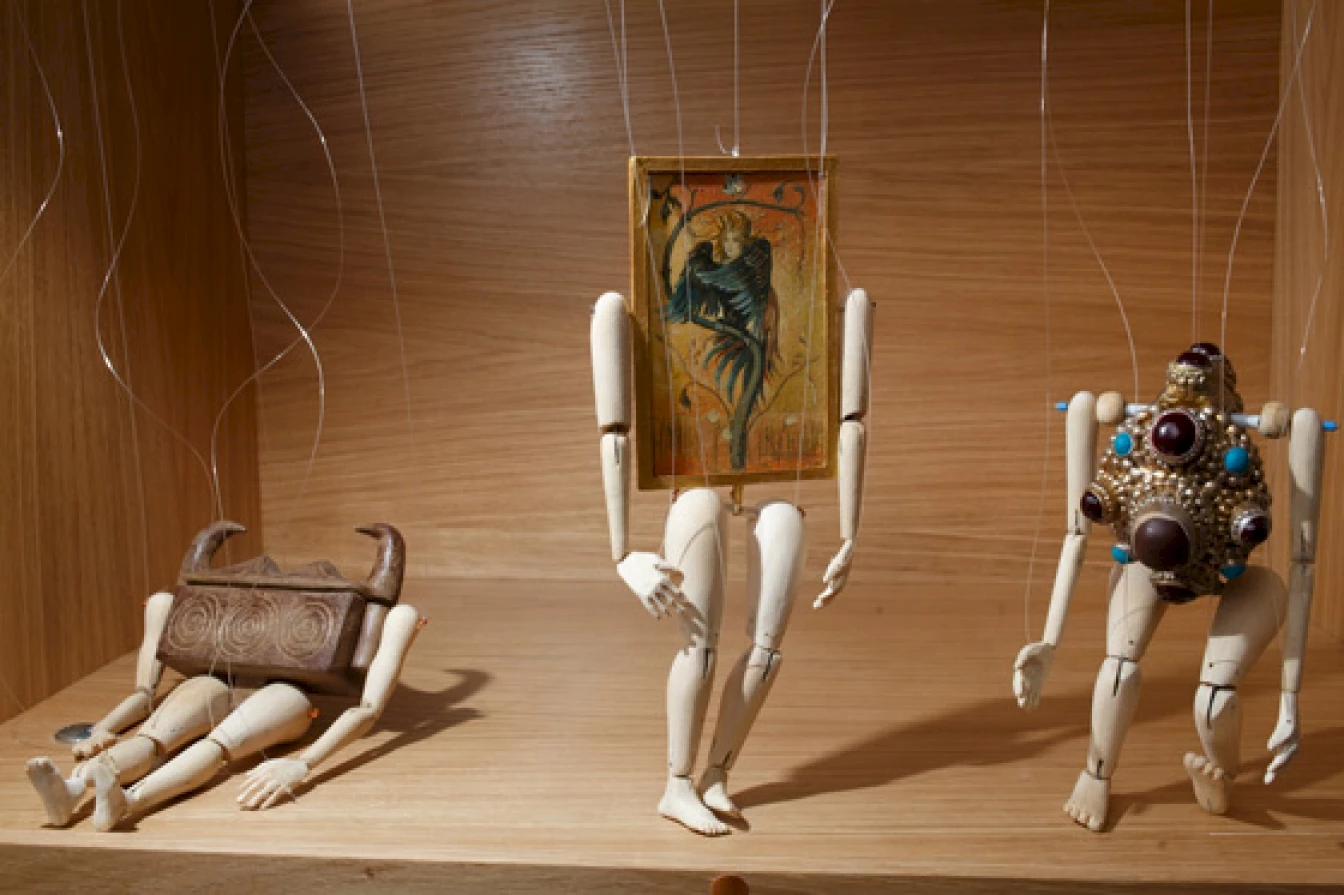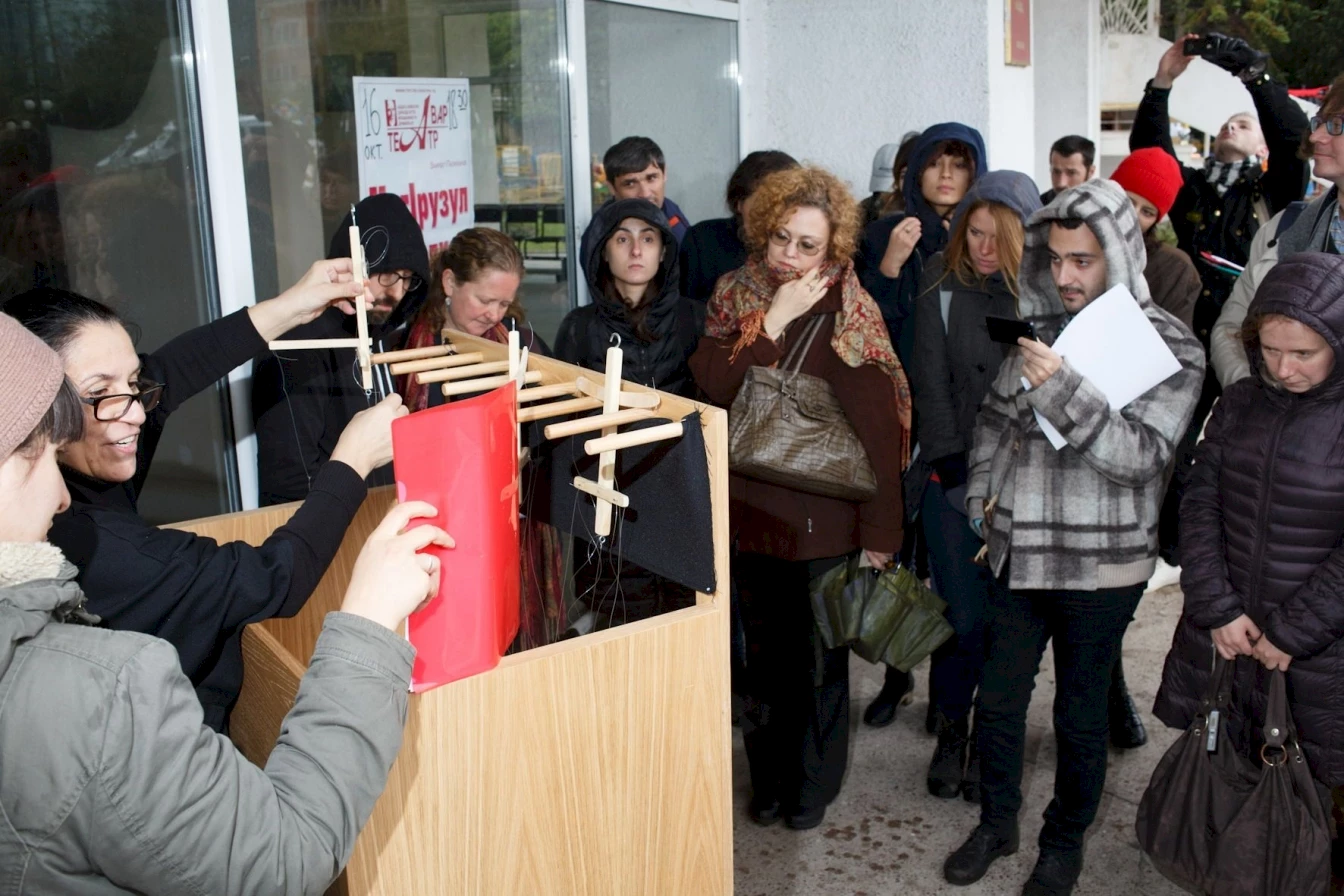A Salt Box and a Bracelet Conversing with a Painting. Decolonising a Post-Soviet Museum in the Caucasus

Taus Makhacheva, Way of an Object, 2013. Installation view, photographer: Nikita Shokhov. Courtesy of the artist and the photographer.
Museums are institutes of knowledge production, conservation and distribution. Their decolonisation involves their liberation from principles which are deeply-rooted in modernity/ coloniality. Perceptive and epistemic operations which control the appreciation of, and interaction with, artworks and other museum artefacts are problematised. Decolonisation also questions the museum as such, as embodying the "hubris of the zero point" (Castro-Gómez 1995), or the sensing and thinking subject, European by default, occupying a delocalised and disembodied vantage point which eliminates any other possible ways to produce, transmit and represent knowledge, allowing for a world view to be built on a rigid essentialist progressivist model.
Museums in a specific modern/colonial (post-Wunderkammer) understanding were roughly divided early on into two groups: history of fine arts and natural history museums. In the former, Western memory was constructed, preserved and transmitted to future generations. In the latter, the non-European world was represented at large. Later, ethnographic museums placed the non-Western and non-modern subjects between the natural and the civilised worlds supplanting the Orientalist interpretation of the other with a supposedly more open progressive one. Countless contemporary public museums, with their heavy load of mythic national ontologies, continue to reproduce the prevailing modern episteme which appropriates or annihilates the other.
The first steps in museum decolonisation were made in the context of the emergent non-Western feminist and queer activism and postcolonial discourses which were immediately applied in art and curating practices glocally to question the institutional framing of art and the linear historical narrative that museums continued to promote. Among the major epistemic and optical shifts that occurred were a deliberate reversal or blurring of the roles of subject and object, and the destabilising of the bound and coherent, mostly national and often imperial identities that museums helped to forge.1 Examples include both decolonial indigenous people's projects such as the U'Mista Cultural Society in British Columbia (Canada),2 where "the objects appear to be observing the spectators who become objectified by the masks whose eyes seem to be following their movements" (Lionnet 2012, p. 192) and the internal Western critique of museums, such as the famous exhibition A Museum Looks at Itself, Past Imperfect at the Parrish Art Museum in Southampton, New York (1992).
This has led to a collapse of the previously sanctified belief in a single Truth and the museum's mission to convey and preach it. In Neil Curtis's accurate view, the core of this shift was questioning the essentialist way of looking at the world when "the established beliefs and institutions of our modern heritage" were regarded "as not only real but true, and not only true but good" (Curtis 2012, p. 74). Museum institutional architecture has been reconstructed to formulate questions rather than feed the audience with answers, and forget about the excessive spectator disciplining techniques which prescribed what to do, where to go, which way to look and what impression to form. Yet even the most tolerant museums remain by their nature "cannibalistic in appropriating other people's material for their own study and interpretation" (McMaster 2012, p. 377). Thus decolonial issues have lately been appropriated by mainstream art institutions and theories so that they have lost an element of contestation and turned into a nicely packaged and easily digestible postcolonial good, treated through familiar Orientalism, exoticisation, demonisation, turning space into time, and other Eurocentric knowledge frames (McClintock 1992, pp. 84–85). There are numerous examples from the early Magiciens de la terre (Centre Pompidou Paris, 1989) to the more recent Altermodern (Tate Britain, London, 2009).
The decolonisation of the museum often happens through a merging of curatorial and artistic practices when artists-cum-curators critically engage with permanent collections and the spatial and temporal structures of existing museums, questioning the mechanisms of acquisition, selection, representation, interpretation, and appreciation. The most famous instances include Fred Wilson's Mining the Museum (Maryland Historical Society, Baltimore, 1992) and Pedro Lasch's Black Mirror/ Espejo Negro (Nasher Museum of Art in Durham, North Carolina, 2008–10). In exhibition architectonics, this often takes the form of semi-hidden interventions, for example when artefacts of a non-modern culture are presented alongside video art by contemporary authors connected with this particular culture, or when a whole exhibition becomes an assemblage in which objects from ethnographic collections are mixed with ironic fictitious artistic creations. This allows for the infiltration and dismantling of the museum system from within, the dialogical education of a transient decolonial "community of sense", to paraphrase Jacques Rancière (2009).
In the post-Soviet space, the decolonisation of the museum has not yet received all the attention it deserves due to a lack of post- and decolonial discourses and for obvious political reasons. Most curators who accentuate the self-reflexive decentring museum tactics do so in postmodernist ways, ignoring or distorting the darker colonial side of the matter. Such borrowed postmodernist gestures often become delocalised, hand-me-down deconstructions, whereas the actual body- and geopolitics of knowledge and perception of the artists, curators, and institutions, are ignored or suppressed. For example the exhibition Dictionary of the Caucasus. The Land and the People, curated by Olga Sosnina (Tsaritsyno, Moscow, 2012), in spite of its claims to adopt conceptualist tools to deal with ethnographic categories in refreshing ways (Sosnina 2013), in the end reiterated a colonialist vantage point in viewing the Caucasus as a set of Russian/ Soviet stereotypes. The "words" in this dictionary never came from the indigenous Caucasus peoples who remained silent objects of her study;. The significance of the location of this exhibition – Tsaritsyno Palace, where the future of the Caucasus as a Russian colony and the Circassian genocide were decided – was also downplayed.
However there are sporadic attempts to make museums the focus of critical decolonial artistic agency and curatorial practices: Dagestani artist Taus Makhacheva problematises the museum as an imperial institution of aesthetic and epistemic control by letting muted objects speak. Her recent work, The Way of an Object (2013), grew out of the collection of the Dagestan Museum of Fine Arts – an institution that similarly to other Soviet museums in the national republics was originally designed as a combination of indigenous ethnographic collections, conventionally-appreciated Russian art sent from Moscow to aesthetically "educate" the local people, and a section of home-grown art created as a pale mimicking of the Russian canon. Makhacheva took her museum intervention out of the exhibition environment into the street. Several delocalised objects were removed from the museum's aesthetic hierarchy and linear chronology. They were thus symbolically equalised in their value and importance, which allowed them to converse and argue. The artist switched to a mode of representation blending visual art with theatre.

Nikita Shokhov. At the first performance of Taus Makhacheva’s Way of an Object (Dagestan, October 2013). Courtesy of the photographer.
One of the effective gestures for museum decolonising is shifting the focus from the material collection to a narrative which a curator builds around a set of objects, or in spite of them, or even in the mode of "object-less storytelling" traditionally including "reconstructed tableaux, models, moving light shows, life-size replicas, film sequences, audio-booths, commissions from artists, even cartoons" (Spalding 2002, p. 54). In The Way of an Object, Makhacheva merges the verbal and the visual in her adaptation of street marionette theatre. A significant performance site is linked to a traditional ethnic art form whose dramatic medium becomes the site for a conversation between three museum artefacts which have been made into marionettes. In her performance, an Avarian saltbox, a Kubachi wedding bracelet and Victor Vasnetsov's 1897 painting, The Bird Gamayun, discuss the splendours and miseries of being museum objects and dispute the issues of authenticity and stylisation, the fragile boundaries between fine art and decorative and applied crafts, the looting and subsequent mortification of indigenous art in museums, as well as the impermeability and meaninglessness of artificially-imposed canonical works in alien contexts, the possibilities and traps of relational aesthetics and interactive historical museum exhibitions, as well as the interaction between entertainment and critical learning and thinking in museums in contemporary society. Both the bracelet and the saltbox are artefacts of Dagestani culture taken out of their living contexts and depraved of their socio-cultural, utilitarian and cosmological functions when placed in a museum of fine arts. Vasnetsov's painting depicting an ominous bird from Slavic folklore was also taken out of its original context – a particular stylising of Russian folklore in a pre-Art Nouveau version of exoticisation of national past – and became a dead representation of someone else's impenetrable canon, brought to Dagestan in the 1920s to "educate" the local people according to Western/Russian aesthetic norms and therefore carrying a culturally imperialist agenda.
The first performance of this work in Dagestan took place on a rainy and windy October day in 2013. The drenched audience was trembling in front of a puppet theatre in the centre of Makhachkala, the capital of Dagestan, and our physical inconvenience added to the intended affect. This spontaneous itinerant impromptu sketch can be set up quickly in any conditions and at any point. The quarrelling objects seemed particularly miserable and homeless as if they had escaped the museum heterotopia (Foucault 1986) to gain freedom but later discovered the darker sides of non-belonging and falling out of time. However this transient experience has ultimately become one more face of a decolonised museum as a forever open and unfinished event.
References:
Castro-Gomez, S. 1995, La hybris del punto cero: ciencia, raza e ilustración en la Nueva Granada (1750–1816) (The Hubris of the Zero Point: Science, Race and Illustration in New Granada (1750–1816)), Editorial Pontificia Universidad Javeriana, Bogotá.
Curtis, NGW. 2012, "Universal Museums, Museum Objects and Repatriation. The tangled stories of things", in BM. Carbonell (ed.), Museum Studies. An Anthology of Contexts, Wiley-Blackwell, London.
Foucault, M. 1986, "Of other spaces", Diacritics, 16.1 (Spring), pp. 22–77.
Gonzalez, JA. 2008, Subject to Display: Reframing Race in Contemporary Installation Art, MIT Press, Cambridge.
Lionnet, F. 2012, "The Mirror and the Tomb. Africa, Museums, and Memory", in BM. Carbonell (ed.), Museum Studies. An Anthology of Contexts, Wiley-Blackwell, London.
McMaster, G. 2012, "The Museums and the Native Voice", in BM. Carbonell (ed.), Museum Studies. An Anthology of Contexts, Wiley-Blackwell, London.
Makhacheva, T. 2013, Story Demands to be Continued, Peri Foundation, Moscow.
McClintock, A. 1992, "The Angel of Progress: Pitfalls of the term 'post-Colonialism' ", Social Text, no. 31/32.
Mignolo W. 1992/2011, "Museums in the Colonial Horizon of Modernity. Fred Wilson's Mining the Museum", in D. Globus (ed.), Fred Wilson: A Critical Reader, Ridinghouse, London, pp. 71–85.
Rabinow, P. 2012, "A Contemporary Museum", in Object Atlas. Fieldwork in the Museum, Weltkulturen Museum, Kerber, Frankfurt am Main.
Rancière, J. 2009, "Contemporary Art and the Politics of Aesthetics", in B. Hinderliter, W. Kaizen et al. (eds.), Communities of Sense. Rethinking Aesthetics and Politics, Duke University Press, Durham & London.
Sosnina, O. 2013, "Project Dictionary of the Caucasus: from ethnography to conceptualist exhibition", Laboratorium. Russian Review of Social Research, no. 2, pp. 240–3.
Spalding, J. 2002, The Poetic Museum: Reviewing Historic Collections, Prestel, Munich, London, New York.